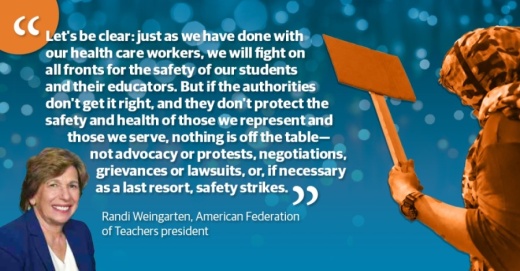The resolution was passed by the AFT's 45-member executive council and announced by AFT President Randi Weingarten during the union's biennial convention July 28, according to an AFT news release.
"AFT members have been on the front lines—protecting, educating, feeding and caring for others. Teachers, paraprofessionals and professors shifted to remote instruction in a nanosecond—an incredible display of dedication and flexibility," Weingarten said during her State of the Union address. "But I mourn those we have lost. More than 200 AFT members have lost their lives to COVID-19."
As the debate over schools reopening continues throughout the U.S., the AFT's resolution calls for school buildings to open only in places where:
- the average daily community infection rate among those tested for COVID-19 is below 5% and the transmission rate is below 1%;
- there is effective disease surveillance, tracing and isolation in the region;
- staff who are at high risk for serious health problems or death if they contract COVID-19 have access to special accommodations or workplace adjustments;
- there is a statewide, city- and/or community-level authority empowered to trigger closure in the event of a spike in infection or when public health standards are not being met;
- the district and school have developed and funded proper safeguards and practices to protect health and safety including:
- physical distancing of 6 feet;
- face coverings to be worn by students and staff;
- access to well-stocked hand-washing facilities;
- resources and staffing to adequately clean and sanitize facilities and buses; and
- necessary updates to ventilation and building systems.
- AFT members and leaders as well as families and community partners are at the table together envisioning and implementing plans to reopen schools.
The resolution mirrors the AFT's plan to safely reopen school buildings, which was initially issued in April and has been updated throughout the summer. According to the release, the most recent update to the plan outlines three essential conditions for school buildings to reopen: low infection rates and adequate testing; public health safeguards, starting with masks and social distancing, cleaning and ventilation, hand washing and reasonable accommodations for those at risk; and the necessary resources to enact each and every one of these safeguards as well as the supports for meeting kids' academic, social and emotional needs.
"But school districts are immobilized by lack of funding and lack of space, by windows that don't open and bathrooms without soap," Weingarten said. "The average school will need at least $1.2 million, or $2,300 per student, to open its doors safely. Assuming no other budget cuts, that's at least $116 billion—to have the resources to protect the health of students, staff and families, and to have the support to meet every child where they are and to advance every child's learning and development."
According to Weingarten, the ability for schools to reopen safely hinges on the federal government as state budgets continue to get slashed amid the pandemic-induced economic downturn.
"Because states have been so badly hit, federal resources are absolutely essential. And parents, students, school staff and their unions have to be involved, not sidelined," Weingarten said. "This is the 11th hour. We need resources now. Our message has gotten through, but we haven't gotten what we need."
Prior to the virus's resurgence, 76% of AFT members polled in June said they were "comfortable returning to school buildings if the proper safeguards were in place," Weingarten said.
"Now they're afraid and angry. Many are quitting, retiring or writing their wills," she said. "Parents are angry, too. A recent [Associated Press] poll shows that the majority of Americans think that school buildings should only reopen with major adjustments or revert to remote instruction."
If school buildings are forced to reopen in communities where AFT-outlined COVID-19 conditions are not met and safety measures are not in place, Weingarten said the union will support the safety of its members by any means necessary.
"Let's be clear: just as we have done with our health care workers, we will fight on all fronts for the safety of our students and their educators," Weingarten said "But if the authorities don't get it right, and they don't protect the safety and health of those we represent and those we serve, nothing is off the table—not advocacy or protests, negotiations, grievances or lawsuits, or, if necessary as a last resort, safety strikes."





